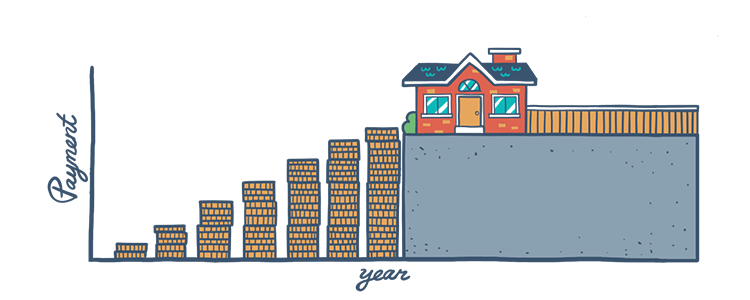Growing Equity Mortgage

Growing Equity Mortgages (GEMs) are part of the FHA’s Section 245(a) loan type that start off with lower initial payments, and increase according to a predetermined schedule over the life of the loan. Similar to a Graduated Payment Mortgage, GEMs are a good option for potential homebuyers who expect higher earnings in the future.
How Does a GEM Work?
Growing Equity Mortgages allow you to purchase a home sooner than you would be able to with most other financing options. There is an introductory year during which your monthly payments are based on a 30-year, fixed-rate schedule. After this initial year ends, your payments increase annually at a fixed rate, depending on the plan that you choose.
The FHA offers five different GEM plans:
- Plan I (Code L):
1% fixed increase per year - Plan II (Code M):
2% fixed increase per year - Plan III (Code N):
3% fixed increase per year - Plan IV (Code O):
4% fixed increase per year - Plan V (Code P):
5% fixed increase per year
GEMs are popular because they can help you own your home sooner. While your introductory payments are calculated based on a 30-year mortgage model, the actual term of your loan is shorter due to the increasing annual payment rate. Your loan term should not exceed 22 years with the lowest plan of a 1% increase, and can be as short as 15 years with the 5% increase.
Every month, more and more money goes towards the principal amount, and the mortgage is paid off faster, which helps you save on interest. So instead of paying interest over 30 years, you'll pay only as long as it takes to pay off the full principal balance, which is a shorter amount of time due to the GEM guidelines.
Who's it For?
Unlike a Graduated Payment Mortgage, a GEM’s scheduled increments of monthly payments result in a shorter loan term and lower cost to the borrower, because it comes without the risk of negative amortization that can lead to an unmanageable balloon payment.
Though HUD’s 245(a) program was designed to assist low-income first-time homebuyers purchase a home sooner than they would be able to with conventional mortgages, it is open to repeat homebuyers as well. They can all take advantage of the FHA’s lenient qualification requirements such as low down payments and credit scores.
Similar to a Graduated Payment Mortgages, this type of home loan is only eligible to purchase single-family properties or condominiums that will serve as the borrower’s primary residence and not an investment property. This loan type is ideal for borrowers who expect to see a rise in their income and want to own a home sooner. However, it is also important that borrowers be completely positive of their future earning potential and job security when deciding to finance their home with a Growing Equity Mortgage.

FHA Loan Articles
April 3, 2021Borrowers can choose to refinance for several reasons, but it comes down to prioritizing different benefits. One homeowner may want the lowest possible monthly payment, while another might want the shortest possible term for their loan.
March 24, 2021One of the major arguments people have for renting instead of buying is the large upfront cost of a down payment. Depending on the type of loan program you apply and are approved for, this could mean anything between 3.5% and 20% percent of your purchase price.
March 21, 2021The two basic types of home loans are fixed rate and adjustable-rate mortgages. The mortgage market offers many other options to homebuyers, but these two are the most common, and the first pair from which to pick.
March 15, 2021A key step in the mortgage process is the home appraisal. In the case of home purchase or refinance, this is a task that is almost always required by the lender, and it is important that potential homebuyers understand what, how, and why of a home appraisal.
March 10, 2021The renewable energy industry is growing more and more every year, and many homeowners have implemented energy-efficient strategies in their homes. This can include programmable thermostats, solar panels, new insulation in the attic, etc.
March 6, 2021When buying a home, you have a list of things you need to do. Get pre-approved, arrange for a home inspection, and a few other tasks. One important thing on that list is shopping for homeowner’s insurance.








